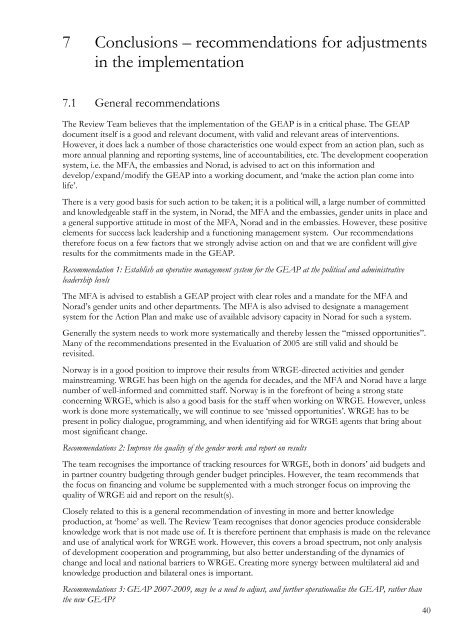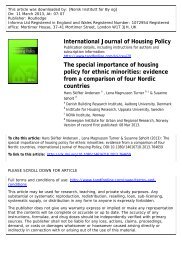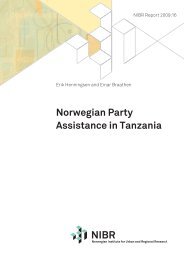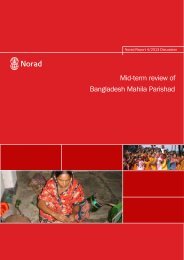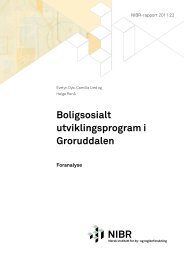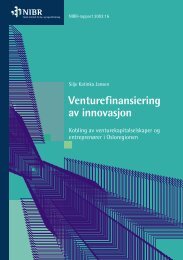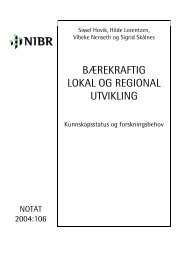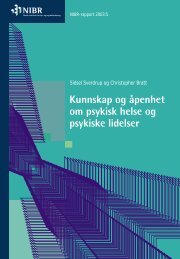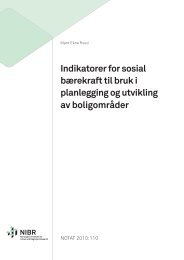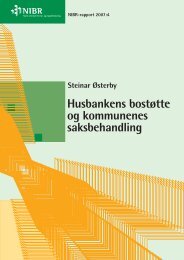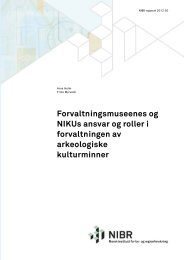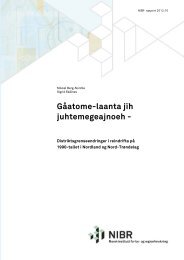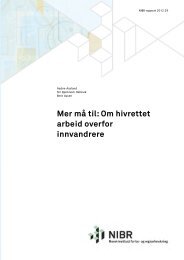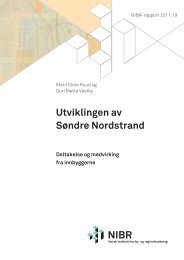7 Conclusions – recommendations <strong>for</strong> adjustmentsin <strong>the</strong> implementation7.1 General recommendationsThe <strong>Review</strong> Team believes that <strong>the</strong> implementation <strong>of</strong> <strong>the</strong> GEAP is in a critical phase. The GEAPdocument itself is a good and relevant document, with valid and relevant areas <strong>of</strong> interventions.However, it does lack a number <strong>of</strong> those characteristics one would expect from an action plan, such asmore annual planning and reporting systems, line <strong>of</strong> accountabilities, etc. The development cooperationsystem, i.e. <strong>the</strong> MFA, <strong>the</strong> embassies and <strong>Norad</strong>, is advised to act on this in<strong>for</strong>mation anddevelop/expand/modify <strong>the</strong> GEAP into a working document, and ‘make <strong>the</strong> action plan come intolife’.There is a very good basis <strong>for</strong> such action to be taken; it is a political will, a large number <strong>of</strong> committedand knowledgeable staff in <strong>the</strong> system, in <strong>Norad</strong>, <strong>the</strong> MFA and <strong>the</strong> embassies, gender units in place anda general supportive attitude in most <strong>of</strong> <strong>the</strong> MFA, <strong>Norad</strong> and in <strong>the</strong> embassies. However, <strong>the</strong>se positiveelements <strong>for</strong> success lack leadership and a functioning management system. Our recommendations<strong>the</strong>re<strong>for</strong>e focus on a few factors that we strongly advise action on and that we are confident will giveresults <strong>for</strong> <strong>the</strong> commitments made in <strong>the</strong> GEAP.Recommendation 1: Establish an operative management system <strong>for</strong> <strong>the</strong> GEAP at <strong>the</strong> political and administrativeleadership levelsThe MFA is advised to establish a GEAP project with clear roles and a mandate <strong>for</strong> <strong>the</strong> MFA and<strong>Norad</strong>’s gender units and o<strong>the</strong>r departments. The MFA is also advised to designate a managementsystem <strong>for</strong> <strong>the</strong> <strong>Action</strong> <strong>Plan</strong> and make use <strong>of</strong> available advisory capacity in <strong>Norad</strong> <strong>for</strong> such a system.Generally <strong>the</strong> system needs to work more systematically and <strong>the</strong>reby lessen <strong>the</strong> “missed opportunities”.Many <strong>of</strong> <strong>the</strong> recommendations presented in <strong>the</strong> Evaluation <strong>of</strong> 2005 are still valid and should berevisited.Norway is in a good position to improve <strong>the</strong>ir results from WRGE-directed activities and gendermainstreaming. WRGE has been high on <strong>the</strong> agenda <strong>for</strong> decades, and <strong>the</strong> MFA and <strong>Norad</strong> have a largenumber <strong>of</strong> well-in<strong>for</strong>med and committed staff. Norway is in <strong>the</strong> <strong>for</strong>efront <strong>of</strong> being a strong stateconcerning WRGE, which is also a good basis <strong>for</strong> <strong>the</strong> staff when working on WRGE. However, unlesswork is done more systematically, we will continue to see ‘missed opportunities’. WRGE has to bepresent in policy dialogue, programming, and when identifying aid <strong>for</strong> WRGE agents that bring aboutmost significant change.Recommendations 2: Improve <strong>the</strong> quality <strong>of</strong> <strong>the</strong> gender work and report on resultsThe team recognises <strong>the</strong> importance <strong>of</strong> tracking resources <strong>for</strong> WRGE, both in donors’ aid budgets andin partner country budgeting through gender budget principles. However, <strong>the</strong> team recommends that<strong>the</strong> focus on financing and volume be supplemented with a much stronger focus on improving <strong>the</strong>quality <strong>of</strong> WRGE aid and report on <strong>the</strong> result(s).Closely related to this is a general recommendation <strong>of</strong> investing in more and better knowledgeproduction, at ‘home’ as well. The <strong>Review</strong> Team recognises that donor agencies produce considerableknowledge work that is not made use <strong>of</strong>. It is <strong>the</strong>re<strong>for</strong>e pertinent that emphasis is made on <strong>the</strong> relevanceand use <strong>of</strong> analytical work <strong>for</strong> WRGE work. However, this covers a broad spectrum, not only analysis<strong>of</strong> development cooperation and programming, but also better understanding <strong>of</strong> <strong>the</strong> dynamics <strong>of</strong>change and local and national barriers to WRGE. Creating more synergy between multilateral aid andknowledge production and bilateral ones is important.Recommendations 3: GEAP 2007-2009, may be a need to adjust, and fur<strong>the</strong>r operationalise <strong>the</strong> GEAP, ra<strong>the</strong>r than<strong>the</strong> new GEAP?40
The GEAP has been in operation <strong>for</strong> two years and is valid until <strong>the</strong> end <strong>of</strong> 2009. This MTR haspointed out several weaknesses in <strong>the</strong> operationalisation <strong>of</strong> <strong>the</strong> plan and in its management andreporting systems. Ra<strong>the</strong>r than start to work on a new <strong>Action</strong> <strong>Plan</strong> or Strategy, <strong>the</strong> MFA shouldconsider whe<strong>the</strong>r a better alternative is to make adjustments in <strong>the</strong> plan and prolong its life to put <strong>the</strong>necessary measures in place, and <strong>the</strong>re<strong>for</strong>e postpone <strong>the</strong> evaluation to a date later than <strong>the</strong> end <strong>of</strong> 2009.In <strong>the</strong> longer term <strong>the</strong> MFA needs to discuss on a principle level what kind <strong>of</strong> policy documents itshould rely upon. The usual number <strong>of</strong> policy documents concerning WRGE is <strong>for</strong> an organisation tohave a Gender Policy as an overarching policy goal, to have a Gender Strategy to instruct its staff onhow to go about WRGE work, and a time-bound <strong>Action</strong> <strong>Plan</strong> to put certain measures in place andachieve planned results, and give <strong>the</strong> organisation a boost in it work in WRGE.7.2 Conclusions and recommendations <strong>for</strong> <strong>the</strong> Ministry <strong>of</strong> Foreign Affairs(MFA)Recommendations M1: Decide on a management system <strong>for</strong> <strong>the</strong> Gender <strong>Action</strong> <strong>Plan</strong> that allows systematic planning andreporting, and sets priorities and ask <strong>for</strong> resultsContinuing <strong>the</strong> current management system <strong>for</strong> <strong>the</strong> implementation <strong>of</strong> <strong>the</strong> GEAP will not allow <strong>the</strong>MFA to work systematically and document results, nor to document where <strong>the</strong>re are barriers toimproved WRGE work.Recommendations M2: Give clear mandates to <strong>the</strong> gender unit on how wide <strong>the</strong>ir rights and duties to report on <strong>the</strong> <strong>Action</strong><strong>Plan</strong> are, but place overall responsibility <strong>for</strong> <strong>the</strong> <strong>Action</strong> <strong>Plan</strong> at a higher management level.The mandates <strong>for</strong> <strong>the</strong> Gender Unit in GIL are not clear. The current system <strong>of</strong> placing responsibility in<strong>the</strong> departments <strong>the</strong>mselves <strong>for</strong> mainstreaming policy issues, such as WRGE, is sound and should becontinued. What are lacking are good reporting systems and systems <strong>for</strong> holding management in <strong>the</strong>departments accountable.Recommendations M3: Regional Department important as flagship, need to develop improved methods <strong>for</strong> capturingWRGE work in partner countriesRegional state-to-state aid is currently less than 20% <strong>of</strong> <strong>the</strong> <strong>Norwegian</strong> development cooperation, butoverall bilateral aid is close to 50%. Bilateral aid and <strong>the</strong> Regional Department, MFA, has an importantrole as a flagship <strong>for</strong> in<strong>for</strong>ming and communicating <strong>Norwegian</strong> aid policies, including WRGE, and <strong>for</strong>results reporting. It is clear from <strong>the</strong> latest report back to <strong>the</strong> embassies that <strong>the</strong> Regional Departmenthas identified WRGE as an area <strong>for</strong> more concerted ef<strong>for</strong>t and more funding. This work need to bestreng<strong>the</strong>ned and consolidated.Recommendations M4: Set up a gender focal network on <strong>the</strong> management level, to supplement <strong>the</strong> focal network <strong>of</strong> genderknowledgeable persons in a current (loose) network.There is a gender focal point in several <strong>of</strong> <strong>the</strong> departments in <strong>the</strong> MFA, but no functioning network,and no mandates <strong>for</strong> <strong>the</strong> gender focal point or <strong>the</strong>ir potential network. The <strong>Review</strong> Team would advise<strong>the</strong> MFA to establish a proper focal point network and ensure that when members leave <strong>the</strong>ir positions,new members are recruited to <strong>the</strong> network. At <strong>the</strong> same time <strong>the</strong> <strong>Review</strong> Team can see <strong>the</strong> value <strong>of</strong> amore <strong>for</strong>mal network <strong>of</strong> senior management to oversee <strong>the</strong> implementation <strong>of</strong> <strong>the</strong> GEAP. This couldbe placed at <strong>the</strong> top level, <strong>the</strong> Director General <strong>of</strong> <strong>the</strong> Departments or <strong>the</strong>ir deputies, with a mandate toapprove plans <strong>for</strong> <strong>the</strong> implementation <strong>of</strong> <strong>Action</strong> <strong>Plan</strong>s including GEAP, and also to review annualreports, and prepare <strong>the</strong> meetings with political leadership <strong>of</strong> <strong>the</strong> MFA concerning WRGE. We can seeno o<strong>the</strong>r ways to ensure full top management commitment to <strong>the</strong> GEAP.Recommendations M5: Improve guidelines and management systems <strong>for</strong> <strong>the</strong> Gender budget line. Results reporting onWRGE weak. Should be priority area <strong>for</strong> <strong>Norad</strong>/MFA. Annual Report on <strong>the</strong> Gender budget line.GIL/GU has stated in <strong>the</strong>ir work plan <strong>for</strong> 2009 that new guidelines and a management system <strong>for</strong> <strong>the</strong>Gender budget line shall be approved during <strong>the</strong> spring 2009. The <strong>Review</strong> Team supports this, and also<strong>the</strong> development towards a responsible unit <strong>for</strong> <strong>the</strong> selected recipient(s) to manage <strong>the</strong>ir part <strong>of</strong> <strong>the</strong>41


